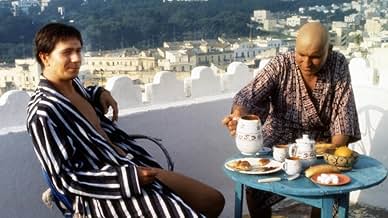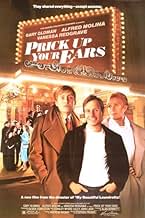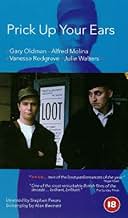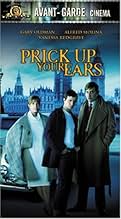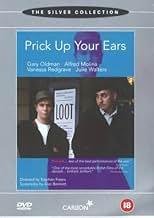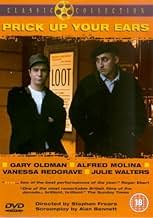Ajouter une intrigue dans votre langueBiographer John Lahr is writing a book about playwright Joe Orton. Joe and Kenneth meet at drama school and live together for ten years as lovers and collaborators. Both want to be writers, ... Tout lireBiographer John Lahr is writing a book about playwright Joe Orton. Joe and Kenneth meet at drama school and live together for ten years as lovers and collaborators. Both want to be writers, but only one of them is successful.Biographer John Lahr is writing a book about playwright Joe Orton. Joe and Kenneth meet at drama school and live together for ten years as lovers and collaborators. Both want to be writers, but only one of them is successful.
- Nomination aux 3 BAFTA Awards
- 5 victoires et 8 nominations au total
Histoire
Le saviez-vous
- AnecdotesAs well as being an actor, Wallace Shawn (John Lahr) is an acclaimed playwright and screenwriter. Until her 1991 death, his theatrical agent was Margaret Ramsay, who was also Joe Orton's agent, and is portrayed in this movie by Dame Vanessa Redgrave.
- GaffesWhen Joe's agent first meets him in 1964, she asks him how he's been supporting himself. He tells her he's on public assistance, getting £3.10 per week. New pence weren't introduced until 1971. However, in the pre-decimal era, "Three pounds ten" would have been understood as "Three pounds and ten shillings", the present-day equivalent being £3.50. For example, "Maggie Mae", recorded by the Beatles in 1969 but based on a much older traditional song, includes the line "Two pounds ten a week, that was my pay."
- Citations
[Halliwell puts his hand on Orton's leg. Orton brushes it off]
Joe Orton: No. Have a wank.
Kenneth Halliwell: Have a wank? Have a wank? I can't just have a wank. I need three days' notice to have a wank. You can just stand there and do it. Me, it's like organizing D-Day. Forces have to be assembled, magazines bought, the past dredged for some suitably unsavoury episode, the dog-eared thought of which can still produce a faint flicker of desire! Have a wank, it'd be easier to raise the Titanic.
The screenplay, by Alan Bennett, is based on critic John Lahr's biography of Orton. Bennett makes the writing of the biography part of the story, and briefly tries to parallel the relationship of Lahr and his wife Andrea (played by Wallace Shawn and Lindsay Duncan), but I'm not sure that it helps the film much. Splitting the story's focus in its early sections removes us from Orton himself. That's who we want to stay with. The only real benefit the Lahr section gives us is one wonderful scene between Ms Duncan and the great Joan Sanderson as her hyper-middle class mother, decoding shorthand sections of Orton's diary to reveal highly salacious behaviour. Ms Sanderson's deadpan performance, enthusiastically uncovering Orton's meaning while remaining steadfastly unshocked, is one of the highlights of the film for me.
There are a dozen or so cameos from other wondrous actors, mostly known for their theatre work -- Margaret Tyzack, John Moffatt, Julie Legrand, Selina Cadell -- as well as substantial support from Francis Barber and Janet Dale as, respectively, Orton's warm-hearted sister and eccentric landlady.
Ultimately, the film rests on the shoulders of the central trio: Orton, Halliwell and Orton's agent, the redoubtable Peggy Ramsay. She is played by Vanessa Redgrave in a glowing performance, that helps to hold the disparate parts of the film together.
Molina's work I've already praised. So we're back to Gary Oldman, who is absolutely brilliant as Orton. What Oldman is able to do is to accept, rather than explain, his characters. He thinks it's OK not to make them totally knowable, and he's right.
Director Stephen Frears is equally difficult to pigeon-hole. He favours realism on the one hand, but on the other he is capable of pulling off highly-charged scenes - like the orgy in a public lavatory -- which might floor less gifted artists.
All in all, an entertaining and informative film, not without its flaws. In particular, its depiction of gay men's lives in the late fifties and early sixties is interestingly honest.
Meilleurs choix
- How long is Prick Up Your Ears?Alimenté par Alexa
Détails
- Date de sortie
- Pays d’origine
- Langue
- Aussi connu sous le nom de
- Das stürmische Leben des Joe Orton
- Lieux de tournage
- Sociétés de production
- Voir plus de crédits d'entreprise sur IMDbPro
Box-office
- Montant brut aux États-Unis et au Canada
- 1 654 743 $US
- Week-end de sortie aux États-Unis et au Canada
- 38 643 $US
- 19 avr. 1987
- Montant brut mondial
- 1 672 927 $US
- Durée1 heure 45 minutes
- Mixage
- Rapport de forme
- 1.85 : 1
Contribuer à cette page



